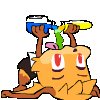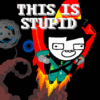
Category All / All
Species Opossum
Size 571 x 1000px
File Size 392.1 kB
Kotiteollisuus is a Finnish hard rock/heavy metal band that was formed in 1991 in Lappeenranta. The band released its first demo tape in 1993 under the name "Hullu ukko ja Kotiteollisuus" ("Crazy Old Man and Home Industry"). The shortened name and current line-up was established in 1997.
Kotiteollisuus is said to combine "furious heavy metal with Finnish sullenness". Subjects frequently touched upon in songs are the current state of the nation, religion and mankind in general. The band members have become known for their outspokenness during interviews and shows. Especially guitarist-vocalist Jouni Hynynen is known for insulting and commenting on the audience during live shows.
Kotiteollisuus is undoubtedly one of the most popular metal bands in Finland, having produced one platinum and several gold-selling albums and winning Emma-awards in 2003 and 2005 for best metal record (Helvetistä itään[1]) and best DVD (Kotiteollisuus DVD[2]) respectively. The band released their tenth album, Ukonhauta, on 18 February 2009.
Tuomas Holopainen of the famous Finnish symphonic metal band Nightwish has played guest keyboards on the band's three latest albums as well as during several live gigs whenever he hasn't been too busy with his other projects, mainly Nightwish.
Kotiteollisuus is said to combine "furious heavy metal with Finnish sullenness". Subjects frequently touched upon in songs are the current state of the nation, religion and mankind in general. The band members have become known for their outspokenness during interviews and shows. Especially guitarist-vocalist Jouni Hynynen is known for insulting and commenting on the audience during live shows.
Kotiteollisuus is undoubtedly one of the most popular metal bands in Finland, having produced one platinum and several gold-selling albums and winning Emma-awards in 2003 and 2005 for best metal record (Helvetistä itään[1]) and best DVD (Kotiteollisuus DVD[2]) respectively. The band released their tenth album, Ukonhauta, on 18 February 2009.
Tuomas Holopainen of the famous Finnish symphonic metal band Nightwish has played guest keyboards on the band's three latest albums as well as during several live gigs whenever he hasn't been too busy with his other projects, mainly Nightwish.
Aerococcus urinae is a member of the bacterial genus Aerococcus. The bacterium is a gram-positive, catalase negative, coccus growing in clusters. Isolates of this species were originally isolated from the urine of patients with urinary tract infections and were denoted Aerococcus-like organisms.[1] In 1992, A. urinae was assigned as distinct species.[2] Due to difficulties in the biochemical identification of A. urinae in clinical microbiological laboratories, the incidence of infections with this bacterium has likely been underestimated and secure identification relies on genetical or mass spectroscopic methods.[3] A. urinae may also cause invasive infections including urosepsis and infective endocarditis, especially in elderly men with underlying urinary tract diseases.[4][5]
The cuneiform šu sign is a common, multi-use syllabic and alphabetic sign for šu, š, and u; it has a subsidiary usage for syllabic qat; it also has a majuscule-(capital letter) sumerogram usage for ŠU, for Akkadian language "qātu", the word for "hand".[2] The human hand is the shape of cuneiform character šu, and thus the origin of its creation (late 4th millennium BC, or early 3rd millennium BC).
The scribal usage of a sign allows for any of the 4 vowels (no vowel 'o' in Akkadian), a, e, i, u to be interchangeable; thus a usage for syllabic qat could conceivably be used for the following (k can replace 'q', and d can replace 't'): q, a, or t; also ka, qa, ad, at. (The "š" (shibilant s) is also interchangeable with the other two esses, "s", and "ṣ", for "šu"!)
The scribal usage of a sign allows for any of the 4 vowels (no vowel 'o' in Akkadian), a, e, i, u to be interchangeable; thus a usage for syllabic qat could conceivably be used for the following (k can replace 'q', and d can replace 't'): q, a, or t; also ka, qa, ad, at. (The "š" (shibilant s) is also interchangeable with the other two esses, "s", and "ṣ", for "šu"!)

 FA+
FA+

![Bentley grumpin' out [Lostshade Comm]](http://t.furaffinity.net/15880277@200-1425153229.jpg)

![[SHRUGGING INTENSIFIES]](http://t.furaffinity.net/13313384@200-1398550605.jpg)



 ke
ke







Comments